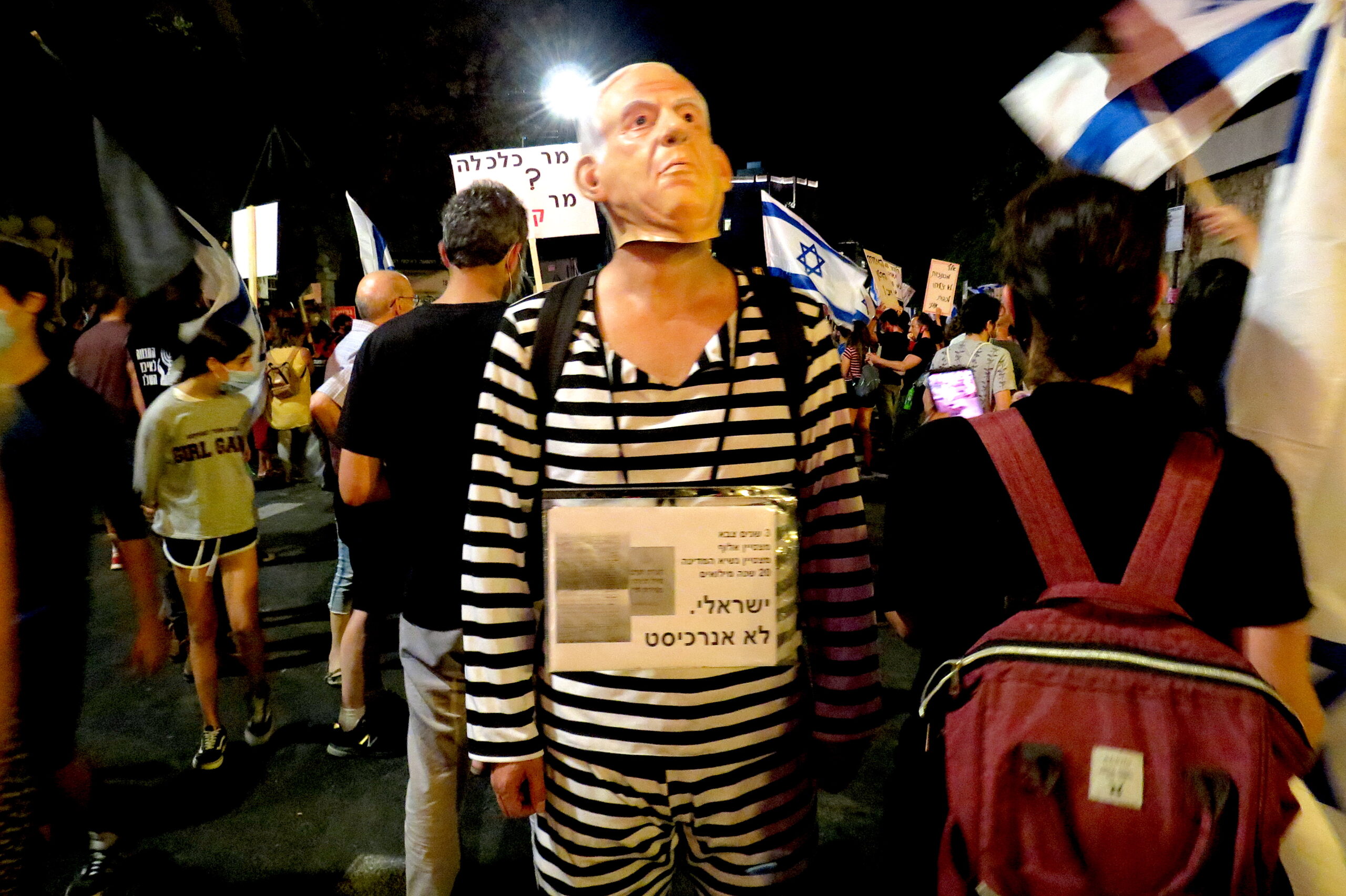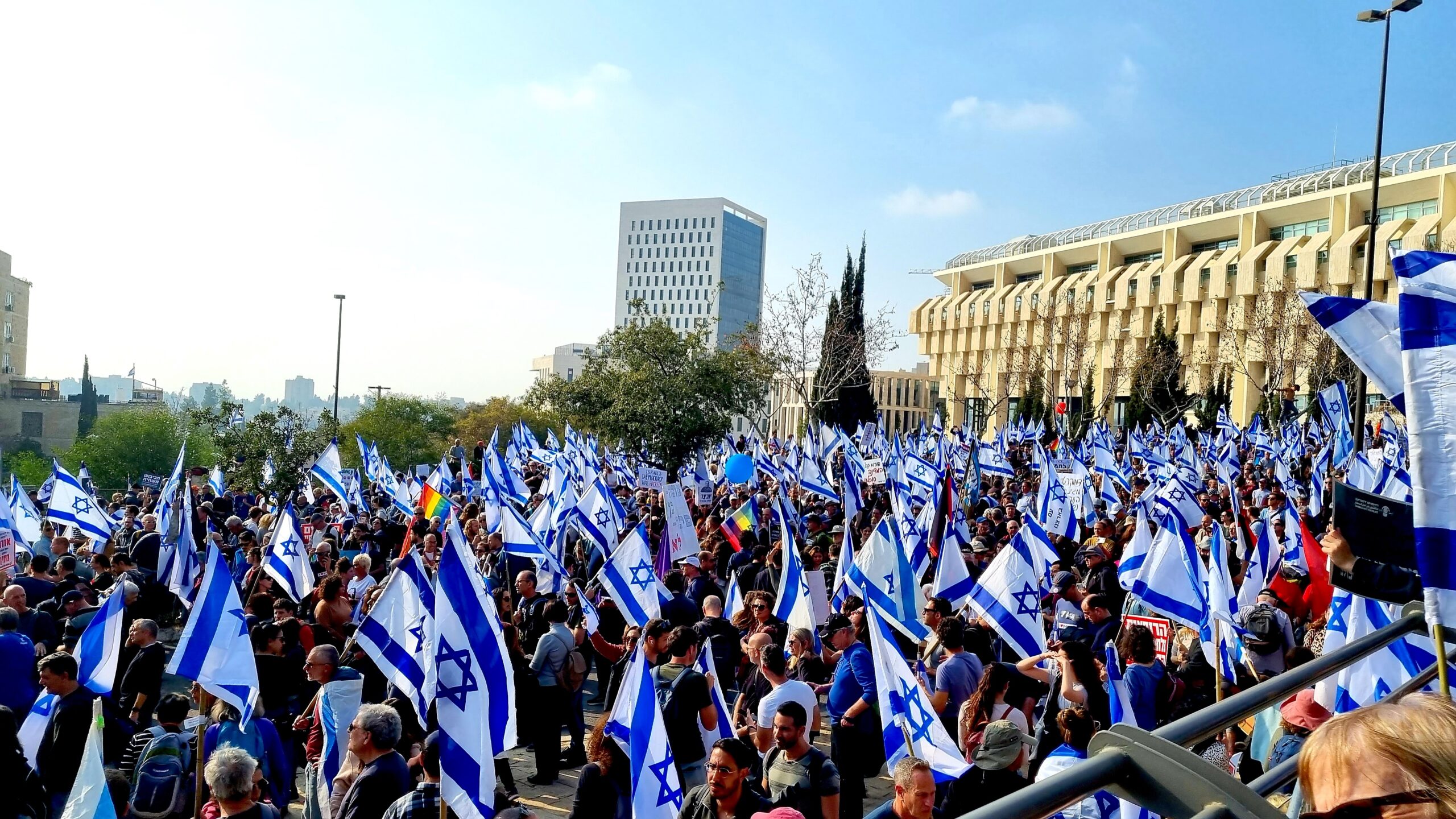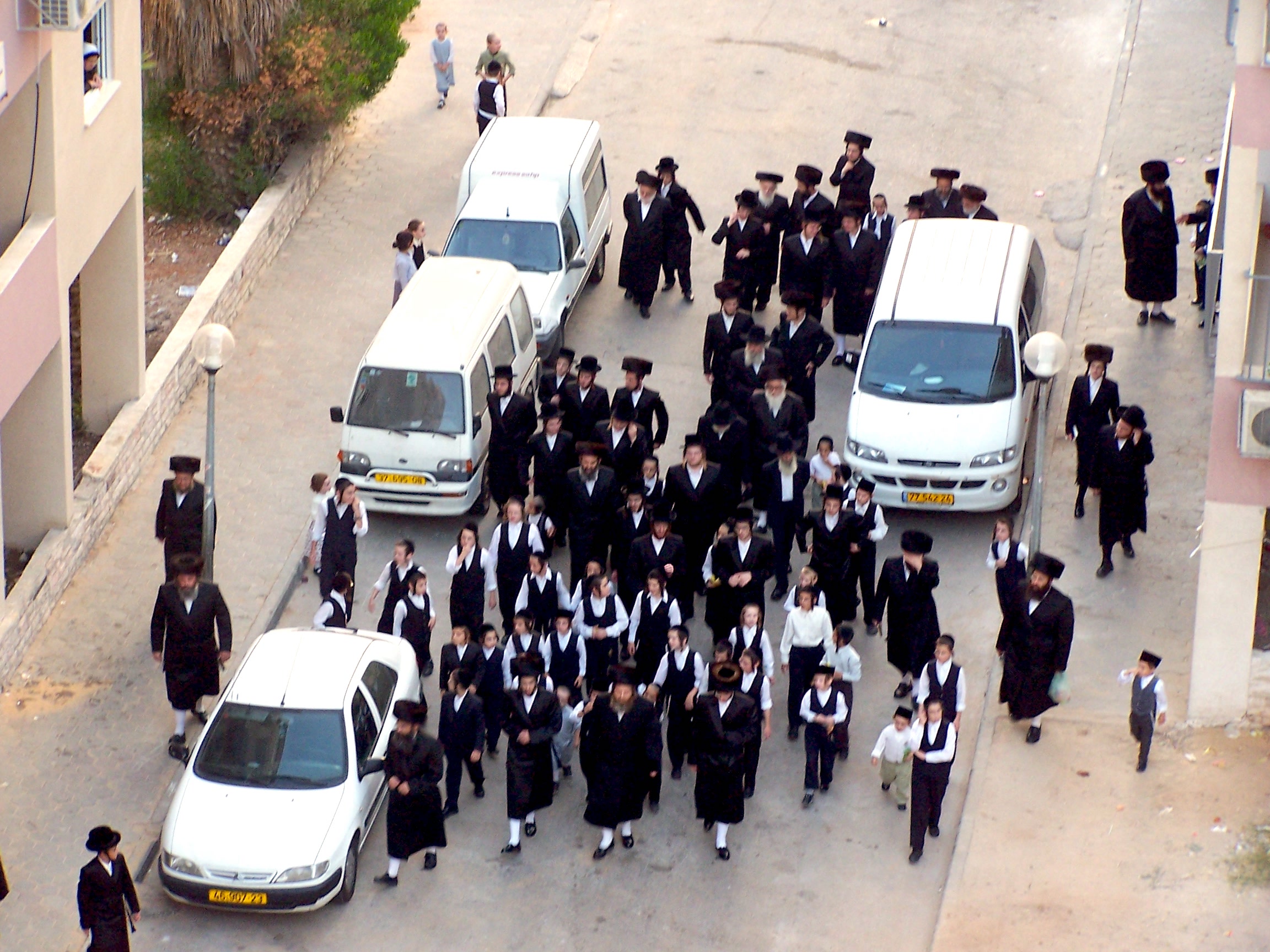The Palestinian Al-Aqsa Flood Operation placed Israel in a historic dilemma that Netanyahu’s comfortable Knesset majority will not be able to resolve, writes Ramzy Baroud.

Israeli protest against Prime Minister Benjamin Netanyahu outside his official residence in Jerusalem on July 30, 2020. (Yaara Di Segni, CC BY-SA 4.0, Wikimedia Commons)

Historically, wars unite Israelis. Not anymore.
Not that Israelis do not agree with Benjamin Netanyahu’s war; they simply do not believe that the prime minister is the man who could win this supposedly existential fight.
But Netanyahu’s war remains unwinnable simply because liberation wars, often conducted through guerrilla warfare tactics, are far more complicated than traditional combat. Nearly six months after the Israeli attack on Gaza, it has become clear that Palestinian resistance groups are durable and well-prepared for a much longer fight.
Netanyahu, supported by far-right ministers and an equally hardline defense minister, Yoav Gallant, insists that more firepower is the answer. Though the unprecedented amount of explosives, used by Israel in Gaza, killed and wounded over 100,000 Palestinians, an Israeli victory, however it is defined, remains elusive.
So, what do Israelis want and, more precisely, what is their prime minister’s end-game in Gaza, anyway?
Major opinion polls since Oct. 7 continued to produce similar results: the Israeli public prefers Benny Gantz, leader of the National Unity Party, over the prime minister and his Likud party.
A recent poll conducted by the Israeli newspaper Maariv also indicated that one of Netanyahu’s closest and most important coalition partners, Bezalel Smotrich, the finance minister and leader of the Religious Zionist Party, is virtually irrelevant in terms of public support. If elections were to be held today, the far-right minister’s party would not even pass the electoral threshold.

Smotrich, left, on Dec. 18, 2023, at the re-appointment ceremony of Bank of Israel Governor Amir Yaron, second from right. President Yitzhak Herzog, second from left; Netanyahu on right. (Amos Ben Gershom / Government Press Office of Israel, Wikimedia Commons, CC BY-SA 3.0)
Most Israelis are calling for new elections this year. If they are to receive their wish today, the pro-Netanyahu coalition would only be able to muster 46 seats, compared to its rivals with 64.
And, if the Israeli coalition government — currently controlling 72 seats out of 120 Knesset seats — is to collapse, the rightwing dominance over Israeli politics will shatter, likely for a long time.
In this scenario, all of Netanyahu’s political shenanigans, which served him well in the past, would fall short from allowing him to return to power, keeping in mind he is already 74 years of age.
Thousands of Israelis have once again rallied in Tel Aviv to protest against Netanyahu over his failure to secure the release of captives in Gaza. pic.twitter.com/YQxFKQMm1b
— PressTV Extra (@PresstvExtra) April 6, 2024
A greatly polarized society, Israelis learned to blame an individual or a political party for all of their woes. This is partly why election outcomes can sharply differ between one election cycle to another. Between April 2019 and November 2022, Israel held five general elections, and now they are demanding yet another one.
The November 2022 elections were meant to be decisive, as they ended years of uncertainty, and settled on the “most right-wing government in the history of Israel” — an oft-repeated description of Israel’s modern government coalitions.
To ensure Israel does not delve back into indecision, Netanyahu’s government wanted to secure its gains for good. Smotrich, along with National Security Minister Itamar Ben-Gvir, wanted to fashion a new Israeli society that is forever tilted towards their brand of religious and ultranationalist Zionism.
Netanyahu, on the other hand, simply wanted to hold on to power, partly because he became too accustomed to the perks of his office, and also because he is desperately hoping to avoid jail time due to his several corruption trials.
To achieve this, the right and far-right parties have diligently worked to change the rules of the game, by curtailing the power of the judiciary and ending the oversight of the Supreme Court. They failed at some tasks, and succeeded at others, including an amendment to the country’s Basic Laws to curtail the power of Israel’s highest court, thus its right to overturn the government’s policies.
Though Israelis protested en masse, it was clear that the initial energy of these protests, starting in January 2023, was petering out, and that a government with such a substantial majority – at least, per Israel’s standards – will not easily relent.
Oct. 7 changed all calculations.
The Palestinian Al-Aqsa Flood Operation is often examined in terms of its military and intelligence components, if not usefulness, but rarely in terms of its strategic outcomes. It placed Israel at a historic dilemma that even Netanyahu’s comfortable Knesset majority will most likely not be able to resolve.
Complicating matters, on Jan. 1, the Supreme Court officially annulled the decision by Netanyahu’s coalition to strike down the power of the judiciary.

Demonstration against judicial refom near the Knesset in Jerusalem, Feb. 20, 2023. (Hanay, CC BY-SA 3.0, Wikimedia Commons)
The news, however significant, was overshadowed by many other crises plaguing the country, mostly blamed on Netanyahu and his coalition partners: the military and intelligence failure leading to Oct. 7, the grinding war, the shrinking economy, the risk of a regional conflict, the rift between Israel and Washington, the growing global anti-Israel sentiment, and more.
The problems continue to pile up, and Netanyahu, the master politician of former times, is now only hanging by the thread of keeping the war going for as long as possible to defer his mounting crises for as long as possible.
Yet, an indefinite war is not an option, either. The Israeli economy, according to recent data by the country’s Central Bureau of Statistics, has shrunk by over 20 percent in the fourth quarter of 2023. It is likely to continue its free fall in the coming period.
Moreover, the army is struggling, fighting an unwinnable war without realistic goals. The only major source for new recruits can be obtained from ultra-Orthodox Jews, who have been spared the battlefield to study in yeshivas, instead.

Group of Haredim in Rehovot, Israel, going to synagogue, 2004. (CC BY 2.0, Wikimedia Commons)
Seventy percent of all Israelis, including many in Netanyahu’s own party, want the Haredi to join the army.
On March 28, the Supreme Court ordered a suspension of state subsidies allocated to these ultra-Orthodox communities.
If that is to happen, the crisis will deepen on multiple fronts. If the Haredi lose their privileges, Netanyahu’s government [which depends on ultra-Orthodox parties for its parliamentary majority] is likely to collapse; if they maintain them, the other government, the post Oct.-7 war council, is likely to collapse as well.
An end to the Gaza war, even if branded as a “victory” by Netanyahu, will only further the polarization and deepen Israel’s worst internal political struggle since its founding on the ruins of historic Palestine. A continuation of the war will add to the schisms, as it will only serve as a reminder of an irremediable defeat.
Ramzy Baroud is a journalist and the editor of the Palestine Chronicle. He is the author of five books including: These Chains Will Be Broken: Palestinian Stories of Struggle and Defiance in Israeli Prisons (2019), My Father Was a Freedom Fighter: Gaza’s Untold Story (2010) and The Second Palestinian Intifada: A Chronicle of a People’s Struggle (2006). Dr. Baroud is a non-resident senior research fellow at the Center for Islam and Global Affairs (CIGA), Istanbul Zaim University (IZU). His website is www.ramzybaroud.net.
This article is from Z Network.
Views expressed in this article and may or may not reflect those of Consortium News.

See: hxxps://www.poetryfoundation.org/poems/43290/the-second-coming
The Second Coming
BY WILLIAM BUTLER YEATS
Turning and turning in the widening gyre
The falcon cannot hear the falconer;
Things fall apart; the centre cannot hold;
Mere anarchy is loosed upon the world,
The blood-dimmed tide is loosed, and everywhere
The ceremony of innocence is drowned;
The best lack all conviction, while the worst
Are full of passionate intensity.
[continues…]
US stop supporting Israel, stop giving them weapons or any kind of funding. Adolf H Netanyahu and his gestapo goons have have so totally disrespected us.
Netanyahu has to go—NOW!
I found an old poem that is so perfect for Netanyahu’s demise.
“Turning and turning in the widening gyre–
The falcon cannot hear the falconer.
Things fall apart—the center cannot hold—
Mere anarchy is loosed upon the world.”———
I think I got the words right, because I remember loving this poem in high school, and it is so perfect for the demise of the awful Netanyahu and his murderous party.
And, if anyone knows this poem, maybe the entire poem could be printed here??? : )
“The Second Coming” by W.B. Yeats
See: hxxps://www.poetryfoundation.org/poems/43290/the-second-coming
Turning and turning in the widening gyre
The falcon cannot hear the falconer;
Things fall apart; the centre cannot hold;
Mere anarchy is loosed upon the world,
The blood-dimmed tide is loosed, and everywhere
The ceremony of innocence is drowned;
The best lack all conviction, while the worst
Are full of passionate intensity.
[continues…]
Good to see Smotrich in a dunce cap in that photo but all of them should be wearing white robes and hoods.
Never forget: Over 90% of Jews in Israel support the genocidal slaughter in Gaza.
The protests you see in Tel Aviv are merely about their own hostages. As far as the 30,000+ dead Palestinians, they’re essentially dogs to them.
This country, if left on its own devices without the support of the U.S., Government and that of Germany would simply be just another Middle East country. Lying, cheating, stealing and murdering would not be so prevlent as it is today. And wonder of wonders, perhaps the world will be relieved of this canard of being the chosen that has supported the Jewish faith for so long.
Israel does not care about a shrinking economy. After all, they own and operate a US Congress. We know where the money will come from. How many days till ‘tax day’? Send your forms and checks to the IRS addresses provided. Both Israel and Ukraine need the money.
Americans, and their Israeli client state, both have some strange ideas about ‘wars’. Both nations believe, the leaders of both nations believe, consistently across the last few decades, that wars have a ‘rally round the flag’ effect that brings the people back behind the leader. And, it is true that in a “peoples government”, that the defense of the government is to call upon the people to come and defend their government. And in a people’s government, the people do come to defend their government.
However, if the leader was unpopular, and the government is actually quite separate from the people, the people don’t always ‘rally round the flag’. Rallying around and burning effigies and wanting to free the prisons are what history says happens in such a case. I know no ‘western leader’ would know enough history to know who Czar Nicholas II was, but they might want to review that example. For that matter, the people being served up as cannon fodder for these modern czars and their modern world wars might want to do the same.
Two very astute comments, Peace Frog. I thank you for articulating the above thoughts and putting them here for posterity to perceive.
And thanks to CN for printing them.